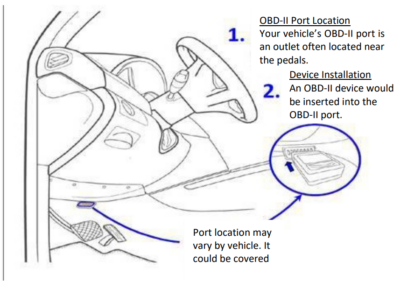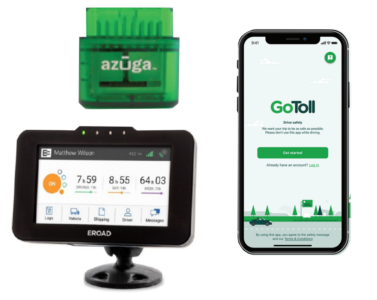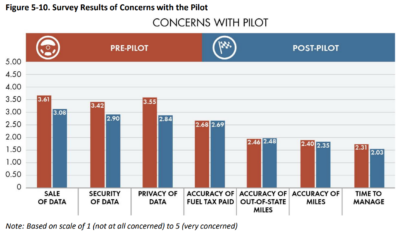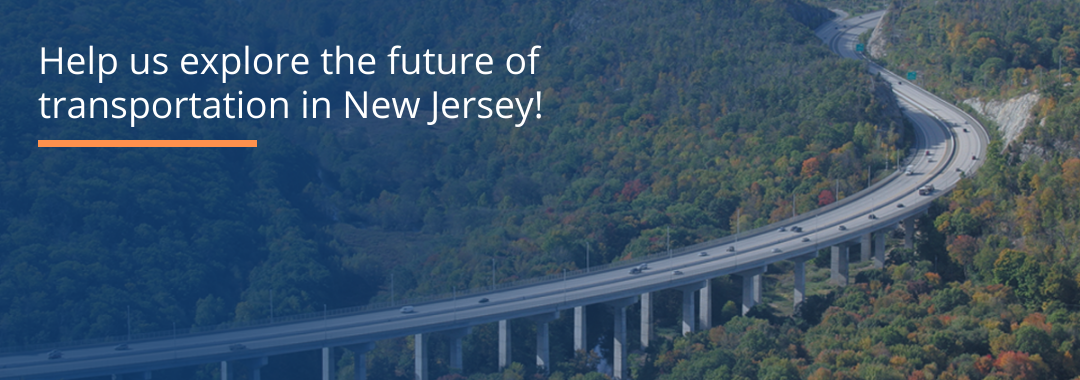With federal and state taxes on gasoline becoming less viable as a mechanism for funding transportation infrastructure, the State of New Jersey is looking for participants with passenger and commercial vehicles for a study on Mileage-Based User Fee study. This study is the most recent, fourth phase of the Eastern Transportation Coalition’s wider exploration of Mileage-Based User Fees (MBUF) as a new model for funding transportation infrastructure.

An alternative way for generating revenues for highway maintenance, repair, and construction, a MBUF would charge motorists by the number of miles they travel rather than “at the pump”. For years now, improvements in the fuel efficiency of motor vehicles (i.e. improved miles-per-gallon) have reduced the gasoline tax revenue generated per user, even as the size of vehicles and therefore their potential for wear on the road has only increased. The advent of widespread electric vehicles (EVs) also presents users who do not pay into gasoline taxes at all. Replacing gasoline taxes with a MBUF would be a way of rebalancing costs and benefits of transportation infrastructure for the modern era.
Implementation of MBUF could take many different forms, hence the need for New Jersey to study aspects of potential MBUF systems, such as methods for tracking miles traveled or ways to still encourage fuel efficient vehicles. Similarly, the Federal Highway Administration (FHWA) has committed to $18.7 million in innovation-oriented funding towards exploring MBUF (1). Notably the Eastern Transportation Coalition (ETC), comprised of New Jersey, 16 other states, and District of Columbia, received support from the FHWA in its exploration of MBUF. The ETC’s “National Truck Pilot and State Passenger Vehicle Pilot” has rolled out four mileage reporting options, with two of them being plug-ins to vehicles’ on-board diagnostic port called a OBD-II Port. One connected plug-in utilizes GPS and the other records miles traveled without GPS.

The other two, non-plug-in options for tracking miles are manual entries of distances recorded by odometers and in-vehicle telemetry. The manual entry is the basic “low-tech” option where the participant provides monthly odometer readings to the Pilot program either through logging into an account to type in the readings or alternatively, they can get a reading automatically by taking a picture of the odometer through an app. For newer vehicles with more advanced electronics, participants can enable their vehicles’ in-vehicle telemetry to automatically send relevant odometer information. Detailed step-by-step instructions for authorizing In-Vehicle Telematics will be provided to the approved participants after enrollment.
Beyond the technical experimentation with hardware, a past phase of the ETC pilot gauged the opinions of motorists and truckers on MBUF systems. For instance, 52 percent of passenger vehicle participants expressed some level of concern about privacy in a MBUF system at the start of their participation (2). By the end of the pilot, however, only 7 percent still had such concerns due to the privacy practices incorporated into how the plug-in technology was utilized. Strategies to ensure privacy, such as the legal prevention of data sales to third parties and the automatic destruction of user data 30 days after the pilot may have allayed some concerns. If representative of the wider public, this change in opinion suggests that reservations about MBUF may be overcome with greater exposure to the system and responsible implementation.

Several other observations and findings from the pilot were reported; for example, motorists and truckers were especially concerned that the MBUF may unfairly impact residents of rural areas, drivers of fuel efficient vehicles, and in-state drivers. There were also worries regarding if reporting and paying miles under a MBUF would be burdensome or convoluted (3). However, information from the previous Phases of the ETC’s pilot actually shows that on average rural drivers would spend less money in a MBUF since they tend to ride less fuel efficient vehicles (2).
Depending on the structure of a MBUF, different rates of payment could incentivize vehicle adoption based on fuel efficiency or EV-status. However, individuals from the trucking sector have expressed concern with this since smaller trucking firms tend to use older, less efficient vehicles; similarly, drivers of older model, less fuel-efficient passenger vehicles may be opposed to such a tiered pricing scheme. A truncated report by the ETC recommends avoiding the tiering of fee rates by fuel efficiency for these reasons. All the same, there is flexibility in the formulation of MBUF to reward fuel efficient motor vehicles, if one-day desired by the public or environmentally necessary.

Continued participation and feedback in New Jersey on the ETC’s MBUF Pilot is therefore critical in assessing how best to ensure that future implementation is fair and effective. Participating is free; NJ participants will receive a $50 gift card for their completion of a pre-study survey at a location of their choice from a select list (4), and another $50 gift card for the completion of a post-study survey, as well. All program-related data will remain secure and confidential, as the data will be destroyed shortly after the completion of the Pilot.

Your participation would take the form of four steps (4):
- Enroll - Fill out the enrollment form by clicking the link on the website.
- Insert - Plug a small device into your vehicle to record mileage.
- Drive - Then drive as you normally do.
- Return - After a few months, mail back the device
If you are interested in testing the technology and offering your insights in an investigation that could future transportation funding in New Jersey, please visit NewJerseyMBUFpilot.com to learn more and enroll by July 31st to participate in this innovative program.
If you have questions, contact a Pilot team member at 609-293-7800 or NewJersey@MBUFpilot.org.
The Eastern Transportation Coalition provides useful information on their Pilot Program and MBUF at the following links:
MBUF Pilot Program Participation Page
MBUF Frequently Asked Questions (FAQ) Page
Exploration of MBUF Approaches for All Users Fact Sheet
MBUF Findings and Reports Page
References
(1) The Federal Highway Administration. (2021, March 16). FHWA Awards $18.7 Million to Eight Projects to Explore New Highway Funding Methods. https://highways.dot.gov/newsroom/fhwa-awards-187-million-eight-projects-explore-new-highway-funding-methods
(2) The Eastern Transportation Coalition. (2022, February). Exploration of Mileage-Based User Fee Approaches for All Users Fact Sheet. https://tetcoalitionmbuf.org/wp-content/uploads/2022/02/Exploration-of-Mileage-Based-User-Fee-Approaches-for-All-Users_Fact-Sheet-1.pdf
(3) The Eastern Transportation Coalition. (2021). Exploration of Mileage-Based User Fee Approaches for All Users.https://tetcoalitionmbuf.org/wp-content/uploads/2022/02/Exploration-of-Mileage-Based-User-Fee-Approaches-for-All-Users_Condensed-1.pdf
(4) The Eastern Transportation Coalition. (2022). New Jersey Mileage-Based User Fee Pilot Program. https://tetcoalitionmbuf.org/landing-page-nj

